The Church and National Liberation
Abstract
Religion can motivate participation in the national liberation struggle. Presently, the participation of Christians in the liberation movement is heavily conditioned by the emergence of international actors such as the US and Vatican. By focusing on the role of Vatican, this paper argues that Vatican policy and church social teaching are distinct. The gap between teaching and policy allows Christians allied with revolutionaries some rationale and shield for their involvement even as Vatican policy enjoins their desistance as a matter of loyalty to the church. The Polish thesis, the dominant aspect of papal policy, is a model of church and church action within a revolutionary context. In the Philippines where there is a rightist dictatorship instead of a Marxist regime, while the local church played an important role in firmly standing up to the dictatorship, it has been at the same time providing oblique legitimation to a leftist-led revolution. Thus, the paper argues that ideological onslaughts on leftist thought must be seen as functionally related to the resolution of the dilemma of the institutional church in the Philippines in the direction of the Polish thesis. Two key strategies for the institutional church are as follows: The church should go beyond the “yellow” stance that political and economic system should simply be made back on the same old tracks; and be different from the “red” stance in its rejection of a violent revolution. Also, in an activist religion, action on societal issues will all be carried out by lay men and women, motivated by their faith, with the support and encouragement of the clergy. For Filipino Marxists and radical Christians, alliance has had a distinctly political and practical hue rather than a theoretical or ideological one. Accordingly, Christians unite with Marxists within the National Democratic Front on the basis of the national democratic program.
Published
2007-11-22
Issue
Section
Features
Keywords
Vatican; Marxists; NDF; dictatorship; Polish thesis
By submitting a manuscript, the authors agree that the exclusive rights to reproduce and distribute the article have been given to the Third World Studies Center.



